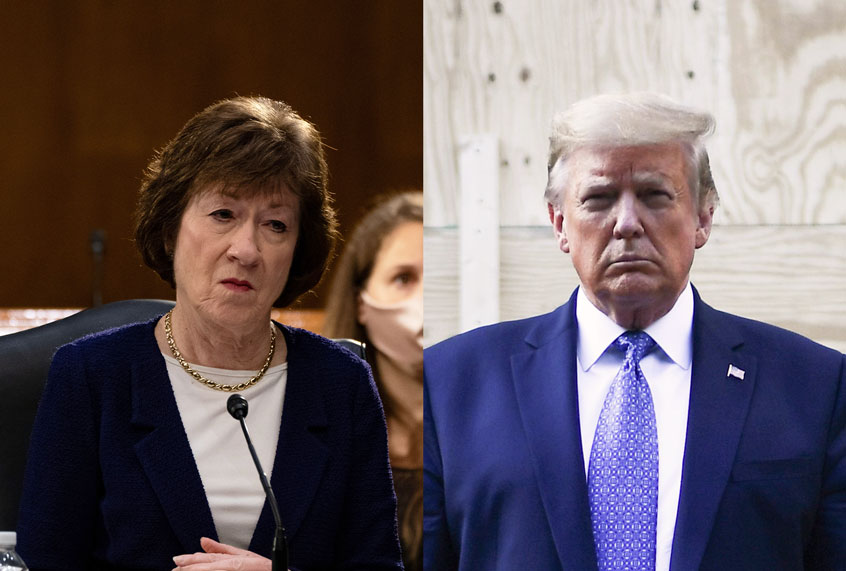Embattled Republican Sen. Susan Collins of Maine refused to tell voters during her final debate with Democratic challenger Sara Gideon on Wednesday whether she would vote for President Donald Trump in this year’s election.
After Gideon pointed out that Collins still had not committed to voting for the president, whose approval rating in the state has been deeply underwater, the debate moderator asked the three-term incumbent directly if she believed Trump deserved another term.
“I’m not getting into presidential politics,” Collins replied, adding that she would be able to work well with either Trump or Democratic nominee Joe Biden.
Instead, Collins made the case for Republicans to retain control of the Senate.
“What I don’t want to see is one-party control in Washington,” she said, “because I think that would lead to a far-left agenda being pushed through the Congress.”
Collins earlier refused to disclose whether she voted for Trump in the state’s primary election earlier this year. The senator did not vote for Trump in 2016. She wrote in another candidate, calling the president “cruel” and “unsuitable for office.”
“My conclusion about Mr. Trump’s unsuitability for office is based on his disregard for the precept of treating others with respect, an idea that should transcend politics,” Collins wrote in a 2016 op-ed explaining her decision.
“Instead, he opts to mock the vulnerable and inflame prejudices by attacking ethnic and religious minorities,” she said, hitting Trump for a “constant stream of cruel comments and his inability to admit error or apologize.”
Election forecasters have recently shifted the pivotal race, which could determine whether Democrats flip control of the Senate, in Gideon’s favor. By Tuesday, Maine voters had already cast about 400,000 votes, and the state’s ranked-choice system may play a pivotal role in the senate race, which is expected to be tight despite Gideon’s steady lead all year.
Under a ranked voting system, voters can select candidates in order of preference. If no candidate takes a majority of first-place votes, then a set of calculations kicks in to eliminate low-performing candidates and redistribute votes.
A new poll suggests that the system appears likely to benefit Gideon, as voters who prefer third-party candidates are more likely to list Democrats as their second choice. The state’s Green Party candidate has outperformed the conservative independent candidate, suggesting that more of the third-party vote would fall to the liberal Gideon.
That poll shows Gideon up by a margin of 46% to 45%. But the Democrat makes more gains when second- and third-choice votes of third-party supporters are reallocated, finishing with 51% of the total versus 49% for Collins. The survey also shows Biden enjoying a comfortable 13-point lead over Trump.
The debate took place just days after Collins voted against the last-minute confirmation of Amy Coney Barrett to replace the late Justice Ruth Bader Ginsburg on the Supreme Court. Gideon, the speaker of the Maine House of Representatives, has repeatedly linked Collins to Trump, as well as Senate Majority Leader Mitch McConnell, R-Ky., who pushed Barrett through the confirmation process in a presidential election year after blocking Merrick Garland’s nomination four years prior. Collins claims she did not object based on Barrett’s qualifications but rather out of fairness for Garland.
On Wednesday, Collins insisted that despite Trump’s appointment of three highly conservative justices, which shifted the balance of the court for perhaps decades, she does not believe that Roe v. Wade or a decision reaffirming it are at risk.
“I think it is extremely unlikely that the Supreme Court would act to overturn both of those precedents,” Collins said.
Collins has seen her support erode following her critical vote to confirm another Trump nominee to the high court, Brett Kavanaugh despite allegations of sexual assault. The critical vote fractured Collins’ support among women in her state and sparked a massive national crowdfunding campaign to back the Democrat who would become her opponent.
Gideon, who has worked to expand access to reproductive care, pointed out that Collins had previously voted for Barrett’s lifetime appointment to a federal appeals court despite her public criticism of Roe.
“So I would ask you: If reproductive choice is important to you, who do you want representing you in the Senate and making decisions about the judiciary and Roe v. Wade?” Gideon said.
“The tide has turned on Senator Susan Collins, who was so popular in Maine that she won nearly 70% of the vote the last time she ran,” Quinnipiac University Polling Analyst Mary Snow wrote last month. “Likely voters are sending the message that there’s no ‘middle of the road’ when it comes to President Trump.”

